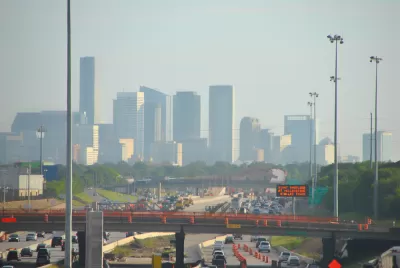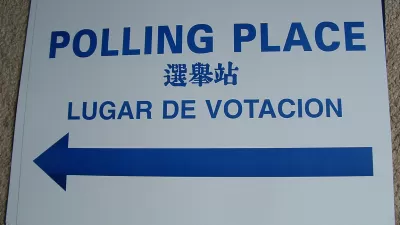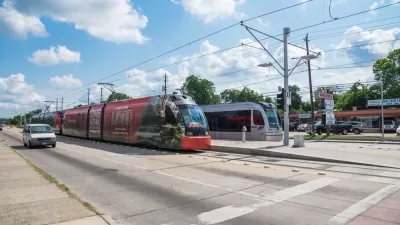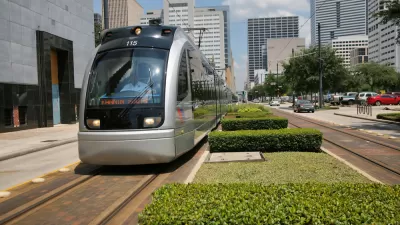The executive director of Environment Texas makes the case for public transit as a key tool in improving air pollution in and around Houston. Houston voters will vote on the MetroNext bond referendum today.

Cars are responsible for an increasing number of bad air days in Houston, according to an op-ed by Luke Metzger, and it's time for the city to focus on cleaner transportation alternatives.
Continuing to double down on costly car-centric infrastructure will only induce more demand for driving and lead to more pollution and congestion, as the expansion of the Katy Freeway years ago proved. Because Houston can’t prosper without clean air, we must clean up the way we get around. And Houstonians can help do that by voting to approve Metro’s bond referendum on this November’s ballot.
If approved, the bond would provide $3.5 billion in funding to implement the MetroNext Moving Forward Plan.
MetroNext will include 75 miles of new bus rapid transit — fast, convenient service that works like light rail, with dedicated lanes and new stations. MetroNext will include 290 miles of “boosted” routes, which will keep buses moving and prevent idling. It will create 16 miles of new light rail, which is electric, and it will fund a 25 percent increase in local bus service, adding new routes and rebuilding stops with shelters and real-time passenger information, It also will enhance accessibility improvements to help people on foot and on bikes walk or ride to cover that first and last mile to and from stops.
The benefits to mobility are one reason to vote for the bond, according to Metzger, but improving the air in Houston is the main selling point. "With MetroNext, by 2040, Houston will see as many as 500,000 vehicle trips eliminated every day. That will reduce the region’s ground-level ozone pollution and our greenhouse gas emissions by 680,000 metric tons every year."
FULL STORY: Remember the dirty air you could see from afar? It’s still with us.

Maui's Vacation Rental Debate Turns Ugly
Verbal attacks, misinformation campaigns and fistfights plague a high-stakes debate to convert thousands of vacation rentals into long-term housing.

Planetizen Federal Action Tracker
A weekly monitor of how Trump’s orders and actions are impacting planners and planning in America.

In Urban Planning, AI Prompting Could be the New Design Thinking
Creativity has long been key to great urban design. What if we see AI as our new creative partner?

King County Supportive Housing Program Offers Hope for Unhoused Residents
The county is taking a ‘Housing First’ approach that prioritizes getting people into housing, then offering wraparound supportive services.

Researchers Use AI to Get Clearer Picture of US Housing
Analysts are using artificial intelligence to supercharge their research by allowing them to comb through data faster. Though these AI tools can be error prone, they save time and housing researchers are optimistic about the future.

Making Shared Micromobility More Inclusive
Cities and shared mobility system operators can do more to include people with disabilities in planning and operations, per a new report.
Urban Design for Planners 1: Software Tools
This six-course series explores essential urban design concepts using open source software and equips planners with the tools they need to participate fully in the urban design process.
Planning for Universal Design
Learn the tools for implementing Universal Design in planning regulations.
planning NEXT
Appalachian Highlands Housing Partners
Mpact (founded as Rail~Volution)
City of Camden Redevelopment Agency
City of Astoria
City of Portland
City of Laramie





























